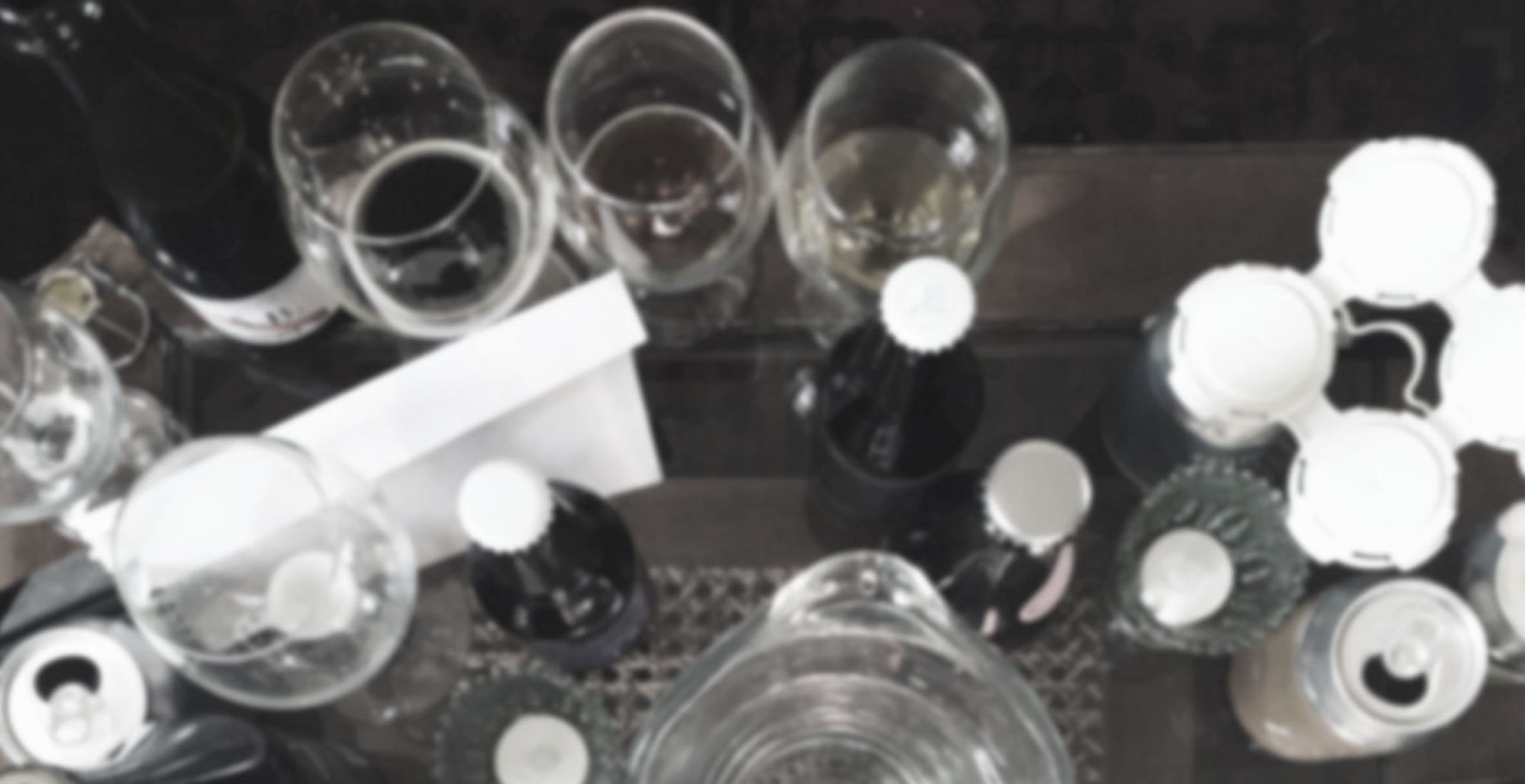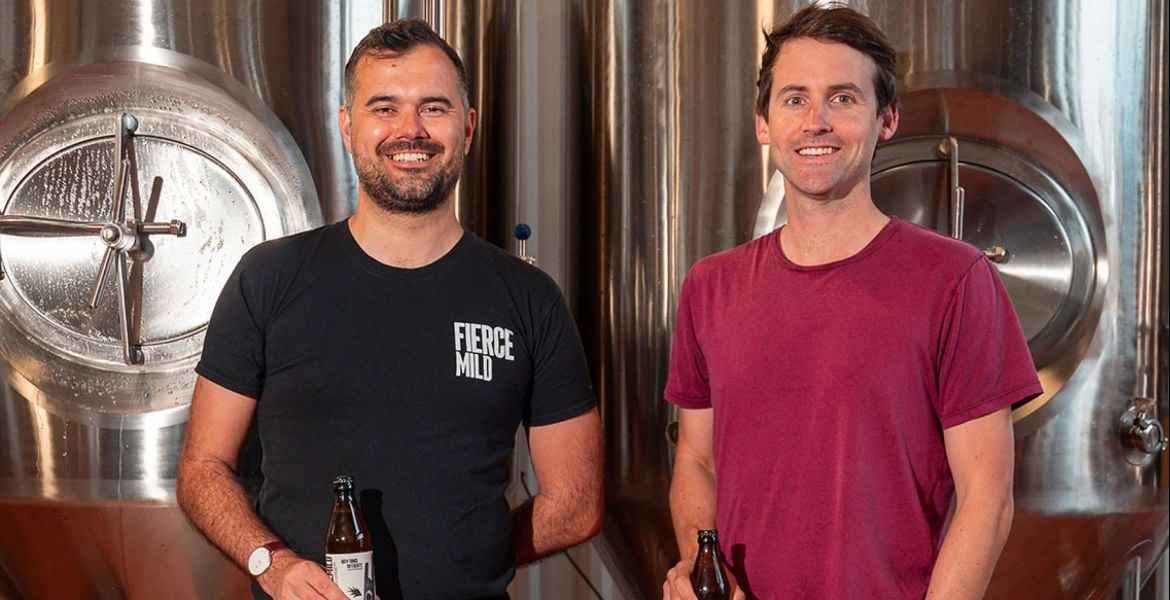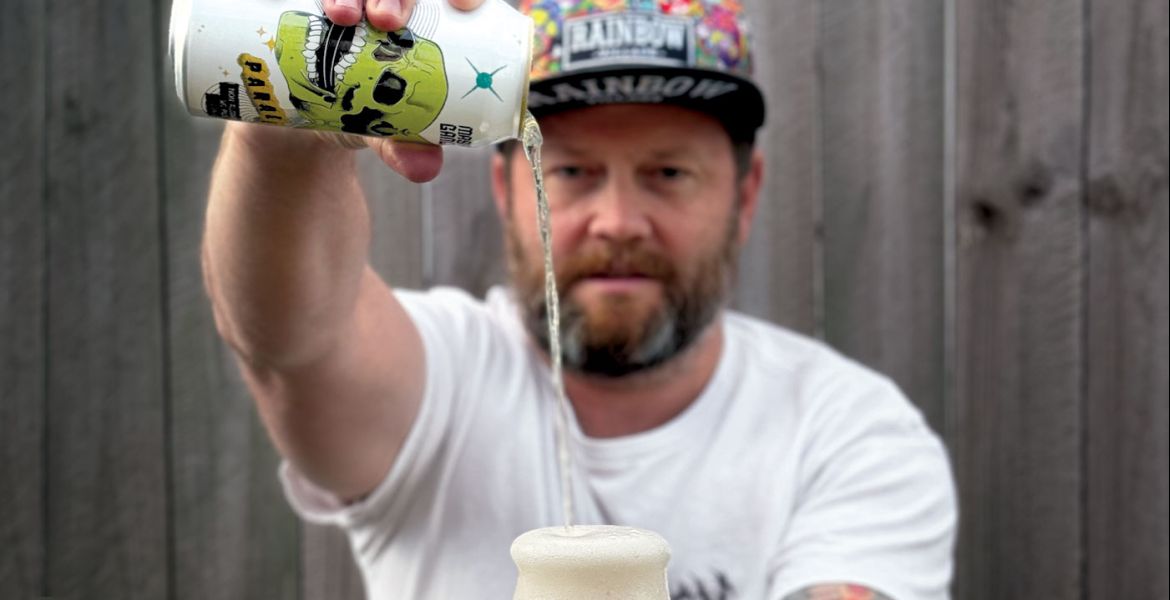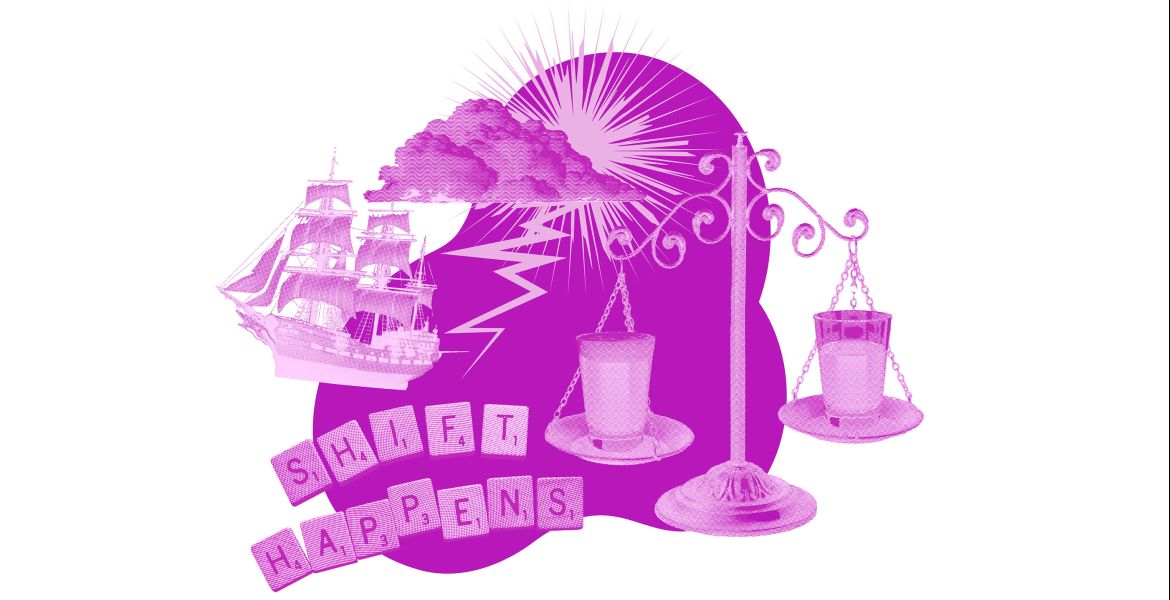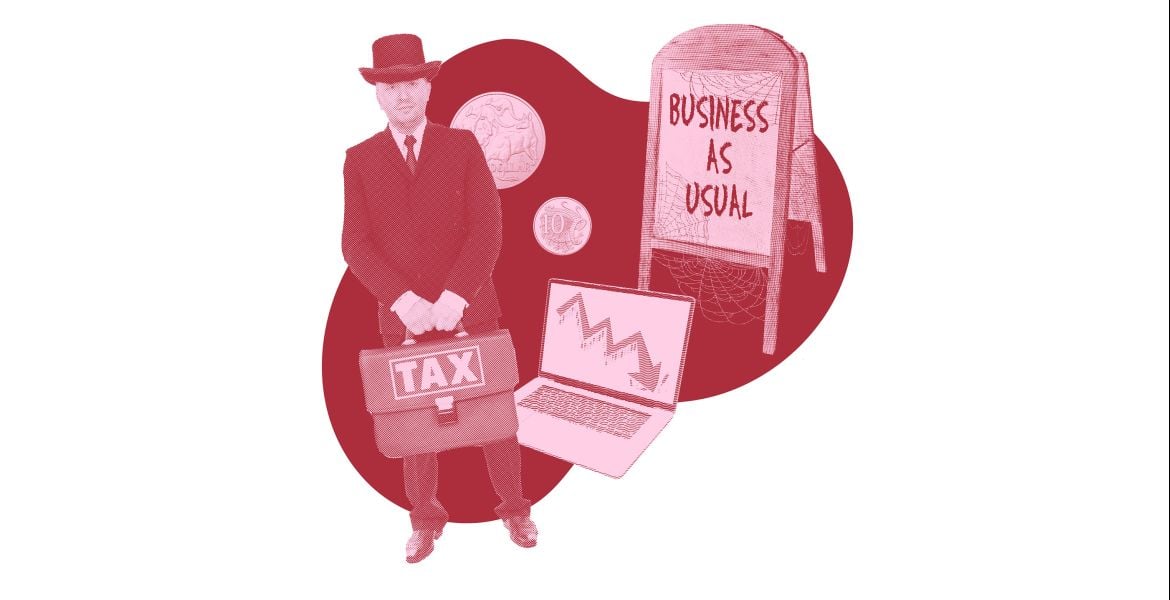Let’s face it: working in the beer industry is a pretty sweet gig. You’re frequently surrounded by fun people in an environment that is based, more or less, around delivering good times to people via the means of flavoursome drinks, often in cool surrounds, with those drinks also possessing the power to make the drinker merry.
What’s more, as the industry grows, there’s ever more great beer out there to try and a buzz that comes with knowing you’re part of something that barely existed a decade ago and doesn’t yet know where it’s going to end up.
Whether you brew, sell or write about beer, it can open doors for you, which might mean meeting other like-minded people or striking partnerships with other worlds, be that food, music, art, sport or pretty much anything else you can think of.
At the same time, our bodies regard alcohol as a poison and it’s one that can be addictive too. That it’s socially acceptable can make an addiction to alcohol much easier to manage than one involving an illegal drug; there’s no need to run the gauntlet every time you need a fix when it’s available everywhere at pretty much every hour of the day and night.
And, while there have been plenty of claims made about beer containing essential trace minerals like silicon, potassium, magnesium, iodine, phosphorus, calcium and plenty of essential amino acids – all of which is true – you can get all of these minerals and proteins by eating a normal diet of normal things that won't damage your organs through prolonged consumption. This is a fact you’ll probably want to keep in mind next time to media covers yet another “study” that claims health benefits from beer consumption.
Dr Michael Livingston, from La Trobe University, is one of the country’s leading alcohol policy researchers. He’s part of the university’s Centre for Alcohol Policy Research and studies trends in alcohol consumption and the potential harms of alcohol as well as advising on public policy.
Michael says that, while the science involving alcohol’s effect on health isn’t always clear, the current guidelines as to what people should drink to keep any ill effects of drinking low are no more than two standard drinks a day. Given the strength of many craft beers today – and, indeed, how much ABV can vary even between beers within the same overarching style – tracking intake can be a challenge, if you’re so minded to keep an eye on it in the first place.
“In some way, people do probably drink less beer when you are drinking [craft beer] but it is often quite high in alcohol so there is that trade off,” Michael says. “Even if you have two stubbies, you might be four and a half standard drinks in, which, if you are doing that every day, might be adding up to a fairly substantial risk to your health.”
Though alcohol can have a different effect on different people over the course of their lives, Michael says the guidelines are there to help people reduce the long-term risk it can do to their body.
“There’s risk in everything,” he says. “It’s about trying to put a threshold somewhere; if you drink more than that, you increase the risk, but people have to make these decisions themselves.”
So what about alcohol free days or AFDs? Are they worth it? How many do you need to make a positive difference? And what about concepts like Dry July? Again, it’s unclear.
“It’s probably beneficial but there’s not great evidence about how much benefit [taking days off has], or how many days, or how often you should do it,” Michael says. “It’s just something that really helps people keep a handle on things themselves.”
Though the ill effects are far from being fully known, Michael says the hospitality industry is a particularly tough world in which to work and remain healthy.
“Hospitality is a high risk group,” he says. “Often that’s because people are young but also because of the culture people are immersed in.”
The challenges of balancing a love of beer and a healthy lifestyle is something that’s the focus of much of Deborah Harrison’s work. She’s a health and wellbeing educator and nutritionist who runs Live Life You, which aims to encourage people to live healthier lives by providing education alongside simple and flexible guidelines.
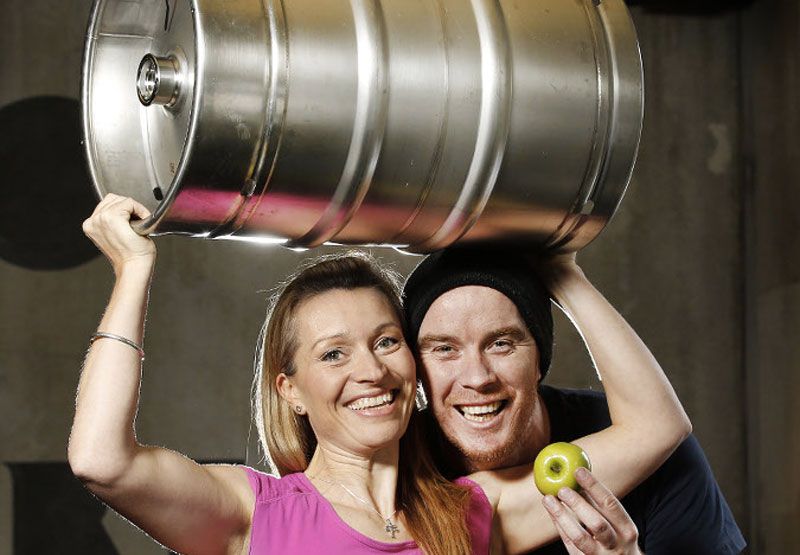
Having spent close to 15 years in the wine industry, Deborah understands the challenges of working long, unsociable hours and being surrounded by alcohol.
“Anyone who does shift work in hospitality lives and breathes it,” she says. “You not only work in it, but you drink in it and eat out in it too. The culture has gotten better but it’s still not that accepted if you don’t want to have a drink.
“It is very hard in an industry where you are surrounded by indulgences; there is a way, but you do need to reprogram your brain.”
One of Deborah’s courses – Drink Beer, Be Healthy – was developed in part because of her husband Glenn’s interest in balancing staying healthy with his love of beer and his job: he’s currently overseeing the beer side of things at Napoleone in the Yarra Valley after stints as head brewer at Temple and Hargreaves Hill.
“Beer’s his vice, he loves beer and not giving beer up, but he also keeps himself reasonably healthy,” Deborah says. “And there has to be a balance without completely sacrificing what you love, whatever that may be.”
Her course was also driven by a desire to get more men to talk about and pay attention to their own health. While alcohol is an equal opportunity vice, she found men were more likely to avoid paying much attention to their wellbeing until something had already wrong.
“It’s when you get a group of guys doing a course together they often realise they can be quite open with how they feel and their habits,” she says.
While the science of nutrition and its complex relationship with physical health and weight is still not fully understood, at the most basic level Deborah says there are some clear facts to consider.
“The issue with alcohol is it’s almost equivalent to fat in calories and fat is an essential nutrient, whereas alcohol is not essential to function.”
It’s also a fact that the vast majority of calories in beer come from the alcohol, regardless of what the advertising for low or no carbohydrate beers would have you believe.
So, while you’ll find few in the beer industry with any complaints about their lot – at least so far as it involves beer – there is a conundrum. Yes, for many it is a dream job, but it’s also one that can take a serious toll on your overall health. Which is the driver for this entry in our ongoing Big Issue series.
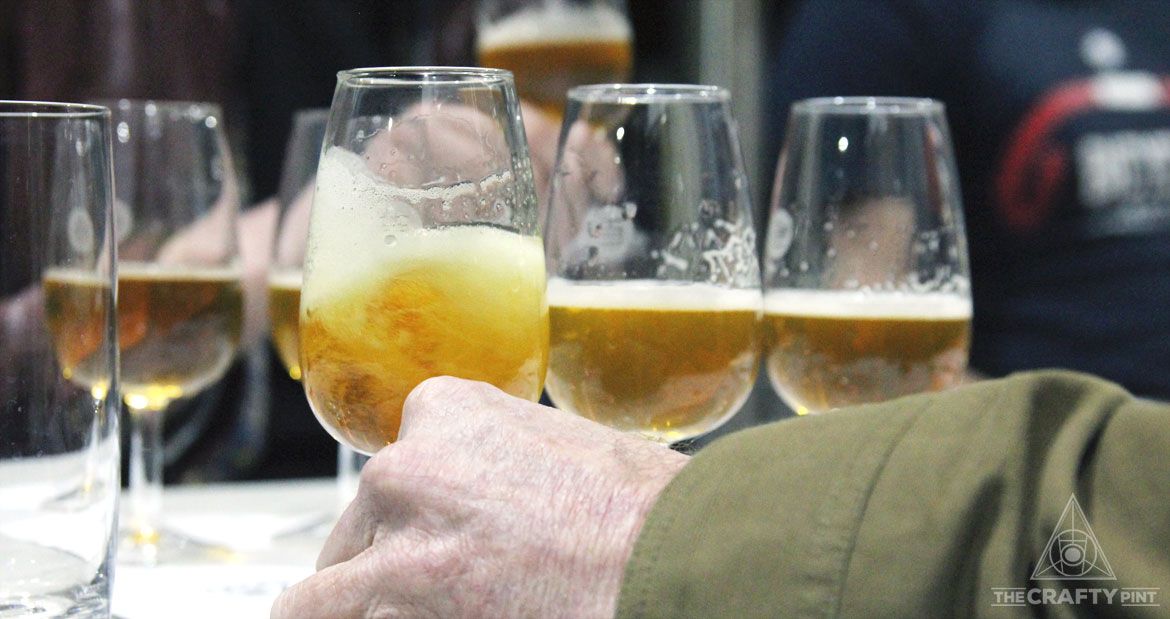
How do people manage the expectation or requirement to drink beer much of the time, be it in terms of health or managing their job as well as a life outside of work? Does drinking beer help people manage the stresses of their work life or can it just make running a business more challenging and the worries more worrisome? Is it possible to have a healthy social life involving alcohol when your day job is based around it?
Is there time – or a desire – left for exercise or to enjoy other hobbies when your work is what most people would call a hobby? Are there lessons for beer geeks whose hobby has become a passion and who are on an eternal mission to sample every delicious drop of beer possible and show off their weekend’s consumption in Facebook groups? Is there a way to find a balanced path when a big part of your life involves pints of Korben D and a kilo of wings?
There are people like WA rep Steve Blaine, who has encouraged many of his peers to join him in his passion for running while fundraising, or the many in the beer world who spend hours every week in the saddle – Ben Kraus at Bridge Road Brewers even launched Ales for Trails this year as a beery incentive for people to build and maintain mountain bike trails – but there are plenty more who are so busy, or having too much fun, to notice their expanding girth and increasing lethargy.
It led regular contributor Judd Owen, whose day job involves providing advice on food safety science and thus has had led him to question why he continues to indulge his passion for good beer when he knows the potential dangers, to address the topic. In doing so, we approached eight people in different roles in the industry, from brewery and bar owners to those involved in selling, marketing and promoting beer and events, as well as the writer that started this site, and asked them a range of questions related to maintaining health in the beer world.
The aim here isn’t to offer concrete answers on the topic of health in the beer world, but to start a discussion, to understand whether it’s possible to achieve balance, and to find out how people are going about it.
The Respondents
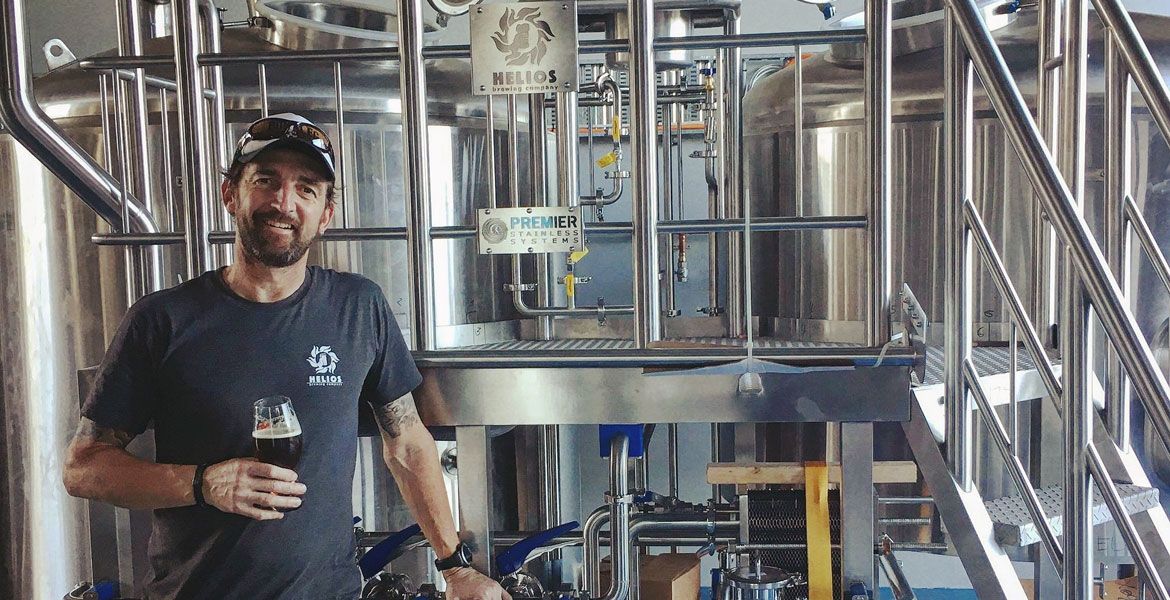
- Charlie Hodgson – Charlie (pictured above) has been brewing for well over a decade, with stints at Gage Roads and Mash Brewing, where he won AIBA Champion Australian Beer for his Copy Cat AIPA, followed by a move to Helios in Brisbane.
- Dave Myers – Dave has a long history working in various roles in the wider hospitality industry, most recently working as a sales rep for Temple and now Balter.
- Gillian Letham – Gillian is a co-owner of two Brisbane beer venues, The Mill in Fortitude Valley and the Oxford Tap House in Bulimba. She has also been one of the driving forces behind the city’s annual Brewsvegas beer week.
- James Smith – James is a journalist who launched The Crafty Pint two years after moving to Melbourne from the UK. He has written two books on beer in Australia and was a founder and festival director of Good Beer Week.
- Jessie Jungalwalla – Jessie is the graphic designer and branding specialist behind Craft Instinct and has been working with many clients in the beer world since returning to Australia from Canada in 2016.
- Mark Howes – Mark is CEO and part of the brewing team at Newstead Brewing, the Brisbane brewery that turned five this year and has struck up a number of partnerships within Queensland, including those in the sporting world.
- Richard Adamson – Richard is another long-standing member of the local beer industry, these days best known as co-founder of Young Henrys in Newtown. He's hosting a session on mental health at Sydney Beer Week 2018 on October 31 – details here.
- Siobhan Kerin – Shev is one of the best known faces in the Melbourne beer scene, with a long history running venues and events. These days, she is the director of Good Beer Week, regarded by many international visitors as the best of its kind in the world.
The Q & A
Do you believe that the relationship between being healthy (physically and mentally) and being expected to drink as part of your job is a difficult one to navigate and not everyone does it well?
Charlie Hodgson: In short, yes, for sure. It certainly can be for me anyway. Breweries are not the most stress-free environments in my experience, whether large or small, and that can and does take its toll on the mental side. Stress can have its impacts on you physically as well.
Dave Myers: There’s no expectation on me in my role to drink and I can honestly tell you that from the top down at Balter there is zero pressure on any member of staff to drink beer at all. This was perfectly exemplified during the time I took three months off alcohol completely, when I was supported and encouraged through the whole process by the team. At the same time, there was a lot of pressure from customers, along the lines of: “How can I buy beer off the rep that won’t drink?” – even after explaining why I was doing it.
There is a massive perception out there for us as sales reps that our role includes a lot of getting “blind” and, for most of us, this is actually not the case. Yes, you will see a beer rep or two at events or beer festivals that may have enjoyed one, two or five IIPAs; yet this is actually – in my experience, at least – a rare moment where we are exposed to the punter. As reps, we spend most of our time alone in a car or speaking to customers. I can understand on the occasions customers do see one of us enjoying a beer, they could be forgiven for thinking: “Gosh, that would be the life” but it’s a small part of it.
In saying all of this, not everyone does well. I know a couple of people in the same role that struggle to keep their drinking under control. I have watched over the years as it has gotten out of hand – and I guess we do have unprecedented access to amazingly fresh beer “samples.”
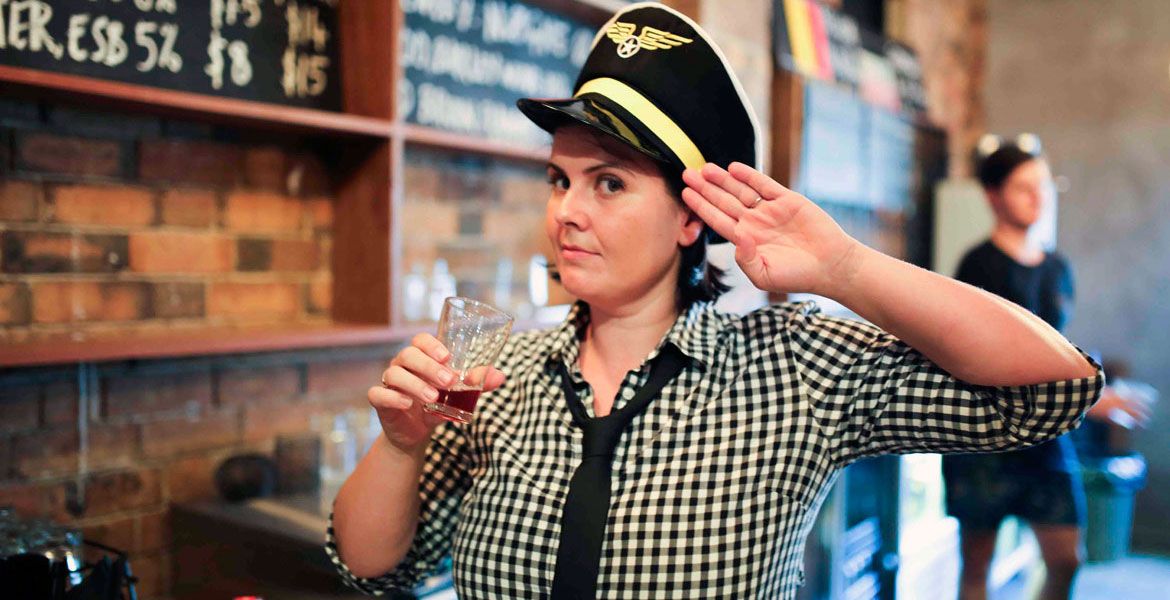
Gillian Letham (pictured above): Definitely, and like many relationships in life there are periods where it’s trickier than others to make the best decisions. Some weeks in the bar it seems we have sample after sample to try – awesome new exciting beers on tap that you want to enjoy – and friends dropping by for lunch or on a night out. These are all unplanned opportunities to drink almost subconsciously but, for me and my team it's about making smart choices. When samples come in we crack them open and share them with our regulars, or split them for knock-offs. It's pouring yourself a pony when your mates are having pints.
This said, I've definitely witnessed times when people struggle; I think mostly it's the other stresses in life that are the struggles and working in our industry it's just easier to go off the rails quicker than if you worked in an office.
James Smith: Yes. And I’m also aware it’s something that’s going to be open to “first world problems” ridicule too. I mean, who wouldn’t want to be sent free beer or be expected to visit breweries, venues and beer events for a living?
As the industry gets bigger, there’s more beer coming the way of the Crafty team, more of everything to cover, a growing business to manage and, as with an increasing number of people in the industry as we get older, kids who still get up at 5.30am whatever time you call it a night.
Now into my ninth year of this beer thing, I’m getting better at navigating it – for the most part – and have regular health MOTs but there are people I worry about.
Jessie Jungalwalla: Yes. I think it takes a lot of will power to be in this industry and maintain a healthy lifestyle.
Mark Howes: Beer is a wonderful tool for social endeavour, for enjoyment and for experimentation. It is, however, a catalyst for poor health and mental wellbeing when used in the wrong way. In and of itself, I see no evidence for alcohol in giving rise to physical and mental problems, but it definitely makes a bad situation worse if you are already struggling in those areas.
It is difficult to maintain your health – physical and mental – while also running a brewery. If a supplier stops by, or a mate comes in to say hi, or a potential business partner has a meeting there etc etc, the first thing you do is grab a beer. It's almost a daily occurrence.
Being able to say no while hosting people is something that has taken me five years to learn. I definitely have not done it well.
Richard Adamson: Like everything in life, balance is the key. Some handle it better than others. It takes a conscious effort and some experience.
Shev Kerin: I definitely believe that a healthy balance is hard to achieve but making this a priority really comes down to the individual. You have the choice to drink and how much. You can always have a pot instead of a pint. It's the individual’s choice to drink to excess and I honestly do not think it's the norm or encouraged in the beer industry.
Are you consciously aware of your alcohol intake and do you take steps to limit it?
CH: Yes I am most of the time, however I can definitely become lax regarding intake especially if I have something particularly good, exciting or that's puzzling me going through the system. I try and keep plenty of water and food going into my system and am mindful of the difference between tasting and drinking
DM: As Dr Karl says: “All drugs are poison, what matters is the dose.”
Day to day, I'm constantly offered alcohol to try as there is alway a new beer launching. Also, when Ocsober or Dry July roll around is the time I actually notice how early in the day and also how often I get offered beer to taste. Obviously, as driving is a major part of my role, it's easy to limit the drinking during the day; second to that point, if I was to lose my driver’s license due to drink driving, it could very much jeopardise my income and livelihood.
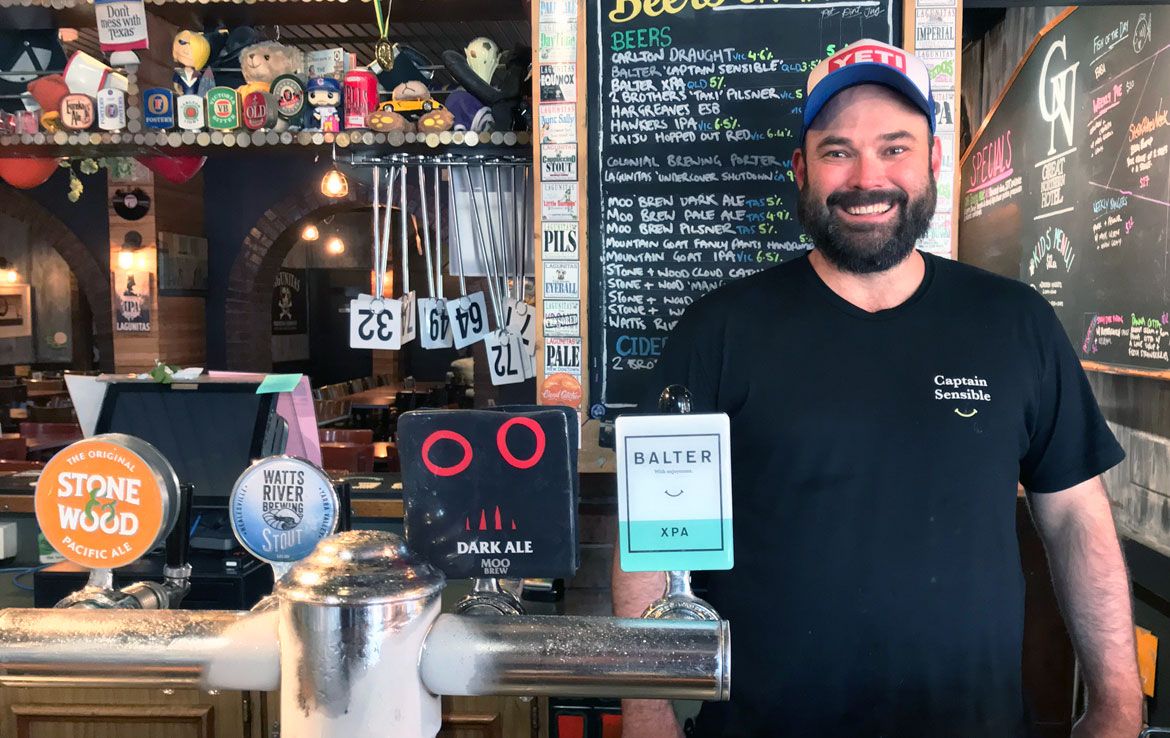
GL: Yes and no! I'm aware of what I drink, but I don't count standard drinks in a week and cut off when I reach a certain limit; I do try to have only two days a week that I'm actually “drinking”.
For me, the hardest part is actually nights off at home. When I'm at work, I'm at work and I like to be in control and set a good example for my team. However, when you're working long hours most days of the week it's easy to feel like you deserve a splurge – Monday nights in my house go off! It's just too easy for me to grab something delicious at the bar to drink on those nights.
JS: The workload and family – plus having some great younger team members with no kids who can attend instead – means I’m out far less these days without having made that a particularly conscious decision (although this can lead to getting carried away when out at a big event or festival…).
Where it’s been most noticeable is the volume of beers that need sampling and writing about. I had one week this year in which couriers dropped off 16 different new releases and, with some brewers sending six-packs or event mixed cases, I think 91 beers arrived in five days. I try to make sure samples get sent to other team members and, obviously, have some very grateful friends who regularly leave ours with a mixed six, or sometimes an entire slab.
Aside from that, I’m keen to have days off every week so, if there’s a backlog building up that needs attention, I’ll get other team members over and do a team sampling of them all in one evening. And, sorry beer lovers, a vast amount of beer goes down the sink once I’ve made my tasting notes…
JJ: Absolutely. I’ve never been one to get blind drunk, but the constant drinking is an issue for sure. I try not to drink midweek these days. And most weeks I break that rule! Willpower is a killer!
MH: As the years have gone on, I have become more and more aware of it. I actively have alcohol free weeks or months in an effort to limit my yearly consumption.
RA: It’s important to factor in some alcohol free days (AFDs) and balance with exercise.
SK: I am conscious of my drinking and ensure regular AFD's are included in my week. Sometimes I drive to ensure I limit my intake. It's all about moderation and willpower.
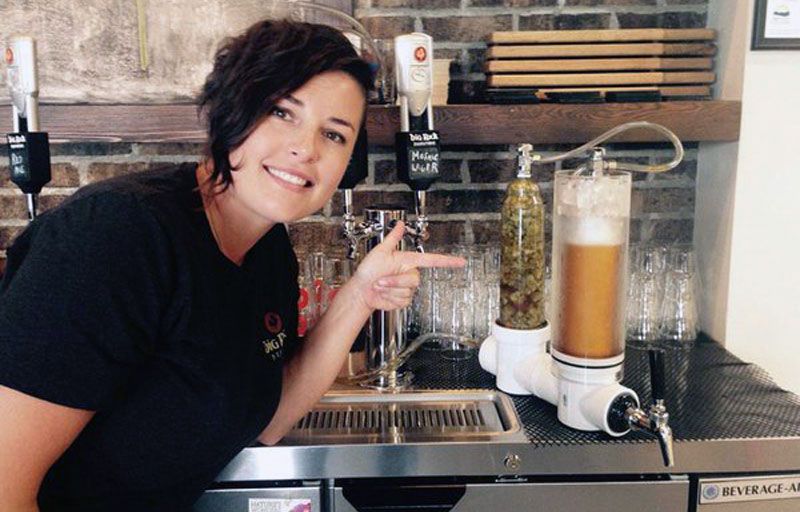
How has your lifestyle changed since entering the beer industry? Have you had issues with weight gain/other serious health issues/mental health issues/social issues possibly related to the nature of your job?
CH: I've always been quite active through my brewing career through riding and racing my bikes. However, the last few years have seen that decline to the point I don't ride much anymore. I'm lucky, I guess, that I have fairly good genetics so weight is not an issue. I do try and force time to lift some weights or get to a yoga class these days.
Mental health issues are certainly relevant for me and my time in the industry. Time and production stress are and can be big factors that knock me about a bit.
DM: Before getting into the beer industry, I had an extremely physically demanding bar job and was lifting kegs, moving boxes of wine and constantly on my feet. Since the switch to the sales role, I now find myself sitting in the car for eight hours a day and only walking from the car park to the front door of the pub, bar or bottleshop.
Unfortunately, weight gain is a massive side effect, so I have to push myself hard to get out and exercise or go to the gym. But, with all of the after hours beer festivals, bar shouts, tastings, staff training sessions etc, it can get a little hard to juggle family, work and personal life – and the gym can quite quickly fall off the radar.
GL: My lifestyle has definitely changed but probably more so from becoming a business owner rather than directly from it being in the beer industry, but there are industry related impacts. Having a regular social life is tough when you're running you own business, made tougher by the fact you keep unsocial hours, and tougher again from probably not wanting to catch up with people too often in a bar!
Regarding weight gain and the mental health impacts you face when you don’t feel your best, for me personally that's a struggle I face more from being in an environment where it's hard to eat right every day of the week.
JS: I’ve realised I’m a workaholic now I have my own business and am doing something I truly enjoy whereas previously I was convinced I was a lazy bugger. So the biggest change is the hours worked and the time on the road.
I try to keep interstate trips short so I’m not away from the family for too long; the downside here is I’ll squeeze as many brewery and venue visits as possible into every day I’m away, then run or be involved in events every evening. All the while the site has to be kept going and the Friday newsletter still has to be written. I tend to return home shattered and with a lengthened backlog of work so have taken to more early nights when away and always book a hotel with gym and pool. A spinal issue means I can’t play sport anymore, so it’s the rather less fun options of gym, swimming and cycling, while I’ve had a personal trainer for the best part of a year too, although finding time to do any of that at busy times of the year is bloody tough.
On the mental side of things, I’m pretty sure my family would put my bouts of grumpiness down to stress. I do regularly work stupid hours and, in combination with the occasional intense trip away, it can become unsustainable, usually meaning there’s a cold or bout of fatigue waiting just around the corner to remind me to slow down...
JJ: Since entering the beer industry I’ve gained ten kilograms. I now have to diet and exercise everyday to prevent myself from putting on more.
Earlier this year, after experiencing months of lethargy, my health practitioner advised me of a candida overgrowth in my gut from the constant beer drinking. To fix the problem I had to not drink beer for three months and go on a super strict diet of no sugar/caffeine/alcohol/starch/yeast/fun. It was super hard, but with the help of a supportive partner I made it almost all the way through! And, I have to say, it was mind blowing the turn around in my health: my energy, creativity and general feelings of awesomeness were through the roof! Which, at the same time, was rather annoying because I want to feel like this all the time and also smash beers! But, according to my gut bacteria, apparently this is impossible. So sad.
I am back to drinking beer but am super mindful of my intake. And now I make sure I only drink amazing beers! If I crack a beer that I’m not impressed by, these days it goes down the sink. It just isn’t worth it.
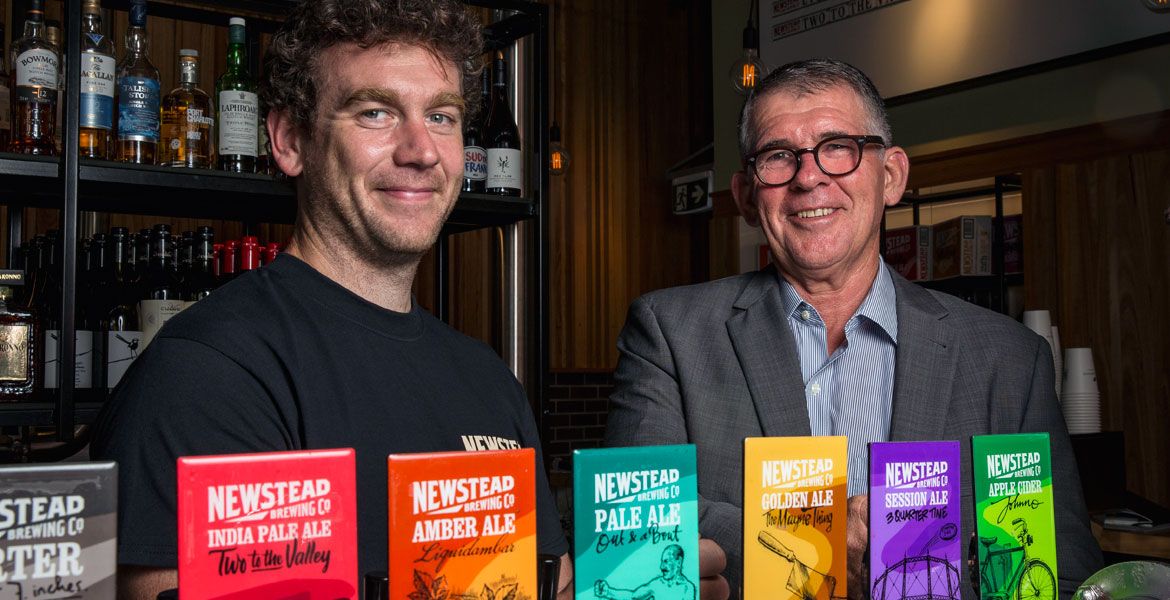
MH: It’s been a pretty tough slog, to be honest. In my five years in the industry, I have gained over 25kg of weight, have stopped exercising as much and have lost a wife and friends.
Now, in hindsight, being involved in the beer industry did not directly contribute to those things and I believe they would have still happened had I been working elsewhere, but it certainly became a crux and a problem. Finding balance, the ability to say no, and to drink in moderation when you are constantly pressured – self inflicted, assumed or otherwise – has been a steep learning curve for me, especially as a business owner, where you constantly feel pressure to go to every beer event, every bar opening, every new release.
Drinking to excess is a serious problem and I think we need more communication, more support and understanding around the consequences of such.
RA: It’s something we are conscious of. The brewing, logistics and events teams are physically active. Our Brisbane sales team trained and entered Tough Mudder. The NSW team has a regular dance class – as can often be seen on our Instagram account
SK: I've come from a hospitality background so it's a lifestyle I've always had. Long shifts, late nights, bad eating habits and drinking have always been part of my normal routine and I am very aware of how unhealthy this has been on me and the physical toll it takes.
Events are incredibly stressful to run so I do need to make sure I'm really on top of my time management and take time out for regular self-care.
There's a common saying around the craft beer industry that people who drink craft drink better beer, not more. Do you think that's true?
CH: That's a good question and, in our venue, I would definitely say it’s true, though out and about I've certainly seen – myself included – quite a few people overindulge on craft beer.
DM: I 110 percent feel this is true, but most of the time the ABV is much higher so I guess it’s all relative.
GL: As a general rule, yes, and 100 percent in my personal experience. Pre-craft beer, days for me I would drink pint after pint of cider, matching round for round whoever I was drinking with; now I more often than not drink ponies or pots, and only really drink schooners of sours on hot days. Overall, my consumption volume has decreased, albeit the ABVs have increased!
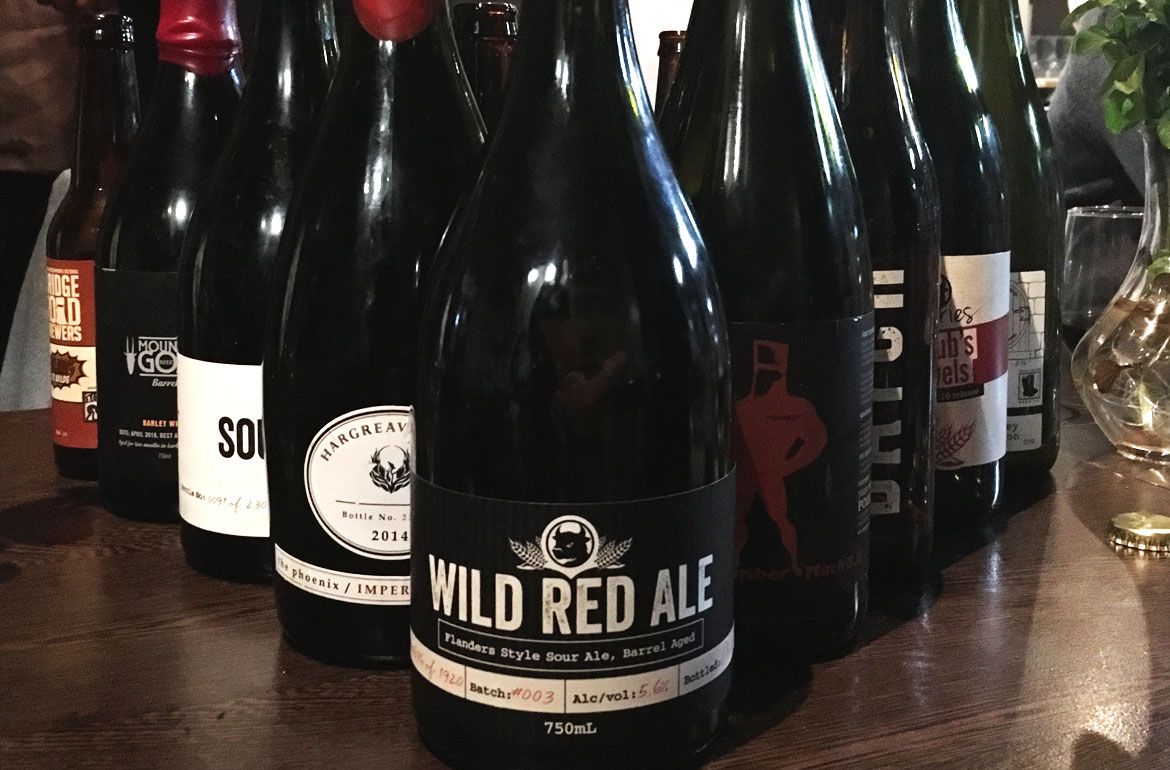
JJ: I think so, yes. Unless you are actually in the industry!
JS: For the most part, yes. I think it’s a case of “craft beer drinkers don’t drink to get drunk, but it can be a by-product of having a good time.” You rarely get any trouble or issues around craft beer as there is a respect for the product, people aren’t drinking to get drunk (mostly) and so it’s based around enjoyment and being social. That doesn’t mean it can’t be damaging if not managed.
MH: In my incredibly subjective experience, yes, that is true. It’s impossible to really say, though, without any data on it. Craft beer, in general, also has more alcohol in it, so even just two double IPAs can do a fair bit of damage. But, yes, there is more of an appreciation for what beer is, and the flavours within it – it’s not just drunk for the alcoholic content.
RA: It’s the same alcohol regardless of the flavour it comes in but, from a behaviour perspective, it does appear that drinking for enjoyment of flavour generally leads to better social environments.
SK: I think this is a nice thought in theory but I don't think the quantity a person drinks has changed.
A schooner of IPA can reasonably contain 12 to 15 percent of a man's recommended daily energy intake and 15 to 20 percent of a woman's. Are you aware that two or three schooners of beer could represent up to half of a person’s recommended daily energy intake?
CH: I did not know that!
GL: Not until I recently started to try and lose a few kgs and looked up the calories per beer – just as well I love me a good old gin & soda as a less calorific alternative!
JJ: No, but thanks for letting me know. I guess...
JS: I’ve used fitness trackers in the past, so yes.
MH: Yes, I’m very aware of that. Thankfully, brewing is quite a physical job, you are constantly lifting and running around so you burn a lot of calories on a daily basis. I have definitely put on more weight – while drinking less – as I have moved out of the brewery on a regular basis.
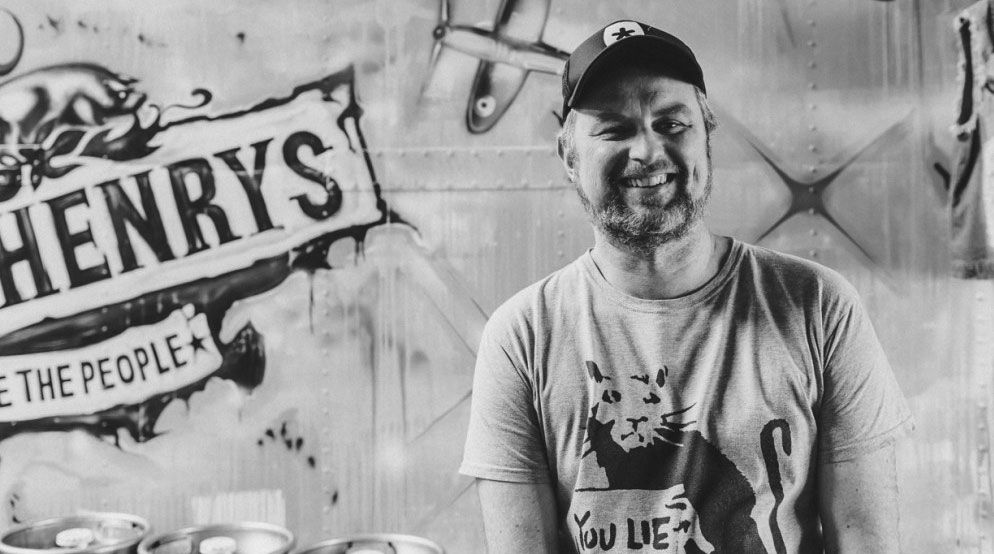
RA: The numbers I’ve seen point to five schooners (NSW size) of a six percent IPA would more closely represent 50 percent of the recommended calorie intake for men. Three schooners or half a bottle of red wine is the equivalent of a Big Mac.
SK: I've never thought about the specifics but assumed it was up there.
Do you think the relative calorific density of craft beer is common knowledge in the beer industry or is nutrition not considered?
CH: I think a portion of the market is definitely aware of it but I think it’s more of a mainstream (beer) thought process. I don't believe craft drinkers are too concerned about it. Let’s face it, there are plenty of other simple changes regarding health and diet we can make other than denying ourselves good craft beer!
GL: To be honest, I think most people know in the back of their heads, but I don't think it's something they really consider until they reach a point where they are looking at their overall nutrition, and then beer becomes a bit of a demon. I think if that information had to be displayed on cans, or tap boards, it would probably decrease consumption. I know since Macca’s put it on their boxes, even when I'm drunk I still think twice about smashing a Big Mac at the end of a night, but I don't often think twice about cracking another tin of Yirg, which probably has the same nutritional value.
JJ: I think nutrition is considered, but maybe people don’t know the exact facts.
JS: I can’t imagine it’s considered much more or less than in wider society as a whole.
MH: It’s probably not that well known. Craft beer drinkers, in my excessively limited exposure, are hardly bastions of physical prowess. I doubt too many people care that much. Beer is there to be enjoyed and counting your calories is not always a great thing.
I think there can be a nice balance between enjoying beer and being physically and mentally healthy; they are not mutually exclusive constructs.
RA: I don’t think calorific density of most food and drink is well considered.
SK: Probably not. It's something I certainly don’t think of. It is common knowledge excessive beer drinking will encourage weight gain so I manage this by limiting my intake and try to eat a healthy diet to compensate.
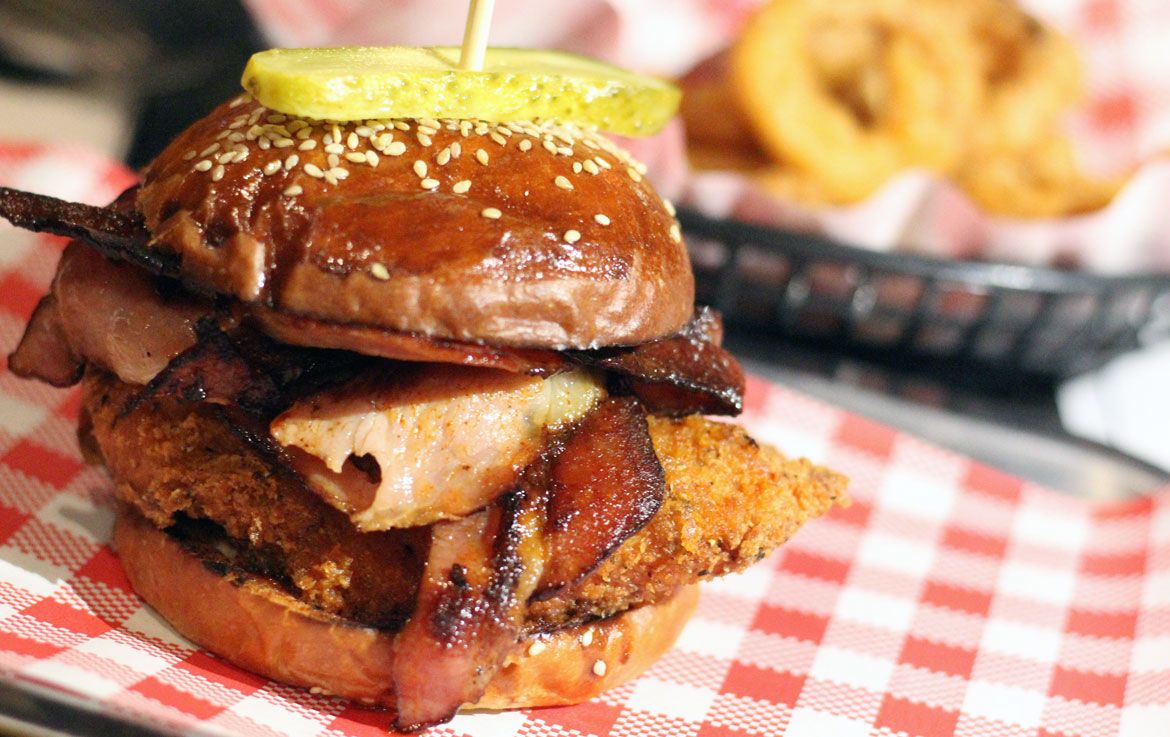
Is it not just the beer? Many breweries/brewpubs offer easy access to burgers/wings/pizzas in addition to staff often working long and irregular hours. Is maintaining a normal diet and/or exercise regime while spending ten hours a day in a brewpub an impossible task?
CH: It’s not impossible but definitely a two plus two equals…
GL: Like I mentioned previously, I think the food and the hours is the real kicker for those of us working in hospitality – this takes so much more effort. With beer you can just say no but you have to eat.
Eating healthily and at regular times is impossible, and I think this is something that 100 percent of my staff struggle with too. Potentially, I should be asking our kitchen to make healthy staff meals at least every other day – I'll keep you posted on initiatives that I can implement to change this!
JJ: Again, it comes down to willpower. But for most people I would say yes.
JS: Being vegetarian can help (although it can also mean a lot of veggie pizzas and falafel kebabs when on the road…). The irregular nature and long hours involved in running The Crafty Pint certainly make a regular exercise regime tricky but diet is easier as I work for myself and spend relatively little time in pubs or breweries compared to brewers and reps.
MH: Some people do it well. I never have. As a business owner, you work long hours, much longer than ten. The last thing you feel like doing when you get home is cook a healthy dinner, so of course you just grab some wings or a burger from the kitchen at work. But I have seen some people who work in a brewpub only eat at work a handful of times per week and constantly bring simple meals from home for lunch.
RA: The fashion of combining American dude food with craft beer maybe one of the most delicious threats to your waistline – one for cheat days or combined with a heavy training program.
SK: Like any full-time job, it takes planning and effort to ensure you eat well. Ten hours a day sitting at a desk is also not great for your health. I have dietaries I need to follow and find when I'm stressed and time poor, convenience becomes the deciding factor and I do pay for it healthwise.
There are heaps of convenient healthy options like Marley Spoon and UberEATS that can stop you from making excuses these days.
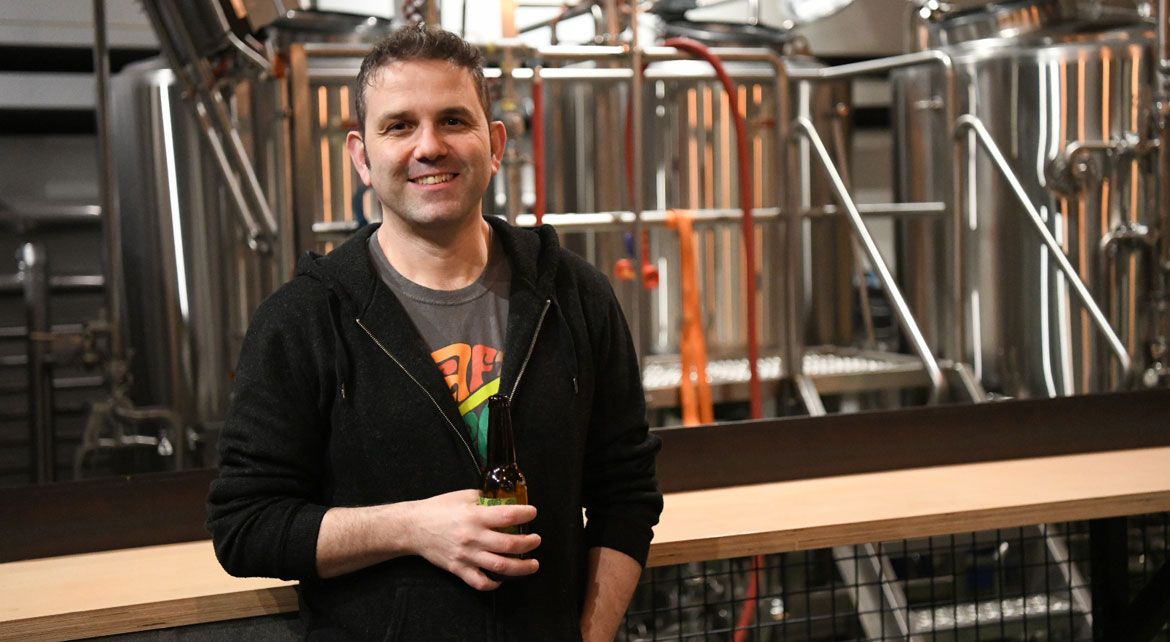
Do you ever find yourself wanting to get away from beer and drinking whenever you can? Have you tried to find hobbies away from beer?
CH: For me, I don't drink that much out of hours or away from functions. Being exposed to it all day is generally enough.
As discussed earlier, cycling was a big pastime – loved racing my mountain bike especially – and would clock up around 6,500km per year between both bikes, but I’ve needed to make some changes that are more time efficient. Some weight training is happening, yoga and running are coming.
DM: Not really, not now I have given up on the chase of the “next, new, biggest beer" and beer festivals for me have lost their shine after having to attend so many.
But I do find it hard to switch off from work due to the fact I actually love my job; I have found the birth of my beautiful little girl has been an amazing circuit breaker to work and am now finding more time to be beer and work free.
GL: Yes, I love to get away from drinking and, more importantly, emails and social media. That's why I love to go hiking or walking at every opportunity and there are plenty of beautiful National Park trails and beaches just a stone's throw from all our bars and breweries – so no excuses!
I've also recently started back running with The Good Beer Running Club in Brisbane, which is a healthy hobby but still involves beer. It's the passion project of local beer boys, Jared Palu and Jimmie Gold, and it's great to see those guys understanding that life needs to be a balance.
MH: Yep, absolutely. Fitness is actually a nice hobby for me and I try to get out and do something five to six times a week. Brisbane has some amazing beer and fitness groups, like the Good Beer Running Club (as Gillian mentioned). Whether it’s trail runs or city runs, it’s all about getting out and being physical but then coming together to share a great coffee or some nice beer. It such an amazing group, run by wonderful people.
RA: I’m working in an industry where you need to be “on” all the time. Good times all the time. Taking time out to decompress can be difficult. Your work involves what most people do to socialise and therefore your social life can disappear.
Most people are attracted to the industry because they enjoy making beer, drinking beer and good food. Your hobbies are now your job. Finding hobbies that don’t involve work is necessary but a lot of your friends will want to drink and dine with you because you’re the expert and have the friends in the industry.
JJ: I live rurally on the Surf Coast so I think it’s easier for me to get away from the bar lifestyle than city-based people. I do love surfing and fishing and playing drums, but two of these things go great with a beer, and one goes great before a beer!
These days, I drink so selectively that I’m back to looking forward to those sessions, whereas before, yes, sometimes I found beer events, meetings with clients, homebrews with friends a bit of a slog to get through.
JS: I find that having regular days off keeps the appetite healthy. There’s also some damn fine and fascinating beers coming out and the industry is full of great people to hang out with so it’s hard to quibble.
As for hobbies, I’m surrounded by good speakers blasting out my choice of music as I work and try to get to gigs and music festivals when possible, while my family ensures I’m kept grounded and reminded there’s more to life than work; we just ordered a caravan so we can get out and explore even more of this amazing land too. Not sure I can squeeze in much more than that, although I really must get the piano tuned and start lessons for the first time in more than a quarter century… And maybe finish a book again one day.
SK: I am always keen to try new things and love getting outdoors with the dog or leaving the city with my friends for a weekend. It just so happens that I’m lucky enough to have turned my hobby – an interest in craft beer – into my career!
If you're reading this in time, you can head to a session on mental health at the Sydney Beer Week Festival Hub at midday on October 31 – info here.
You can check out the work of the Centre For Alcohol Policy Research here and other potentially useful links here:
Last year, Luke Robertson of Ale Of A Time wrote this piece on mental health in the beer industry for Good Beer Hunting.
You can find other features in our Big Issue series here.
About the author: Judd Owen is a two-time gameshow winner, homebrewing tragic and the only person to have successfully mentioned the Oriental Rat Flea in an article about craft beer. You can find him on Instagram and Twitter.



